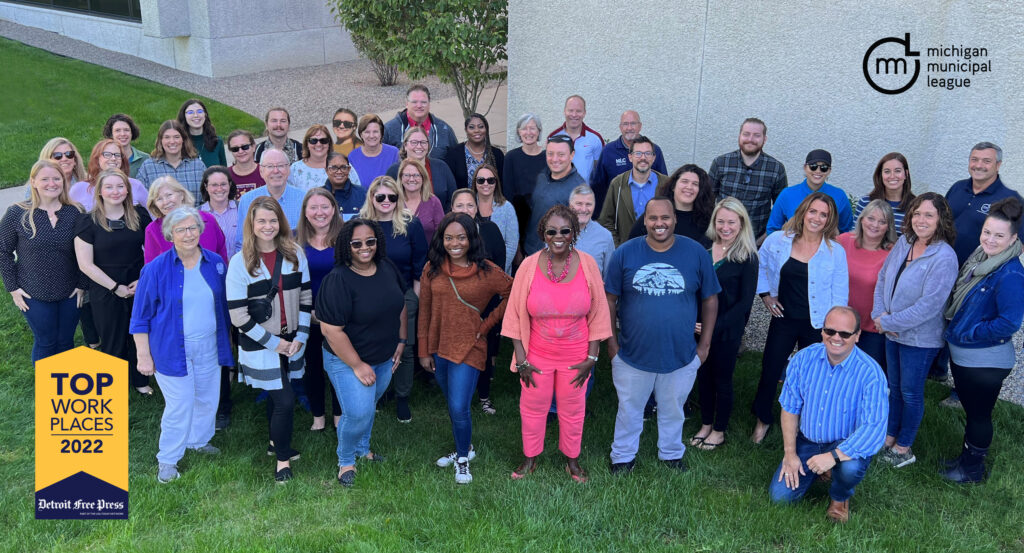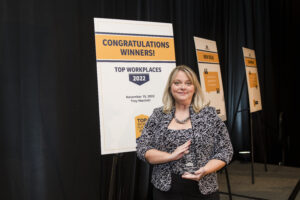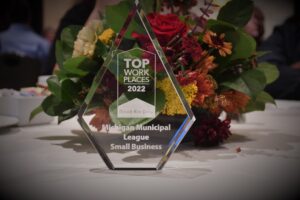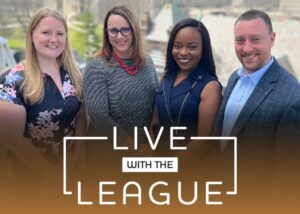 The Michigan Municipal League was recently honored as a recipient of the 2022 Detroit Free Press Top Workplaces Award. View the full list of top workplaces here.
The Michigan Municipal League was recently honored as a recipient of the 2022 Detroit Free Press Top Workplaces Award. View the full list of top workplaces here.
This recognition, which was announced in Sunday’s Detroit Free Press, was a collection of firsts for the League. It was the first time that the MML participated in the survey through which the award is based. And it is the first year the Ann Arbor-based non-profit organization was recognized as a top workplace. The League, which represents and serves more than 520 Michigan communities, was among a total of 55 new workplaces that were given the award in 2022. League staff attended an award’s dinner earlier this month honoring all the winners and the MML’s human resources manager, Mandy Reed, accepted the award on behalf of the organization.

Michigan Municipal League Human Resources Manager Mandy Reed accepts the Top Workplace Award on behalf of the MML.
“Congratulations! I know I speak for the entirety of the League Board of Trustees when I say that we are so proud that the League has been recognized,” said Barb Ziarko, the president of the League’s Board of Trustees and Sterling Heights Councilmember. “This is particularly special for the League since it is the first time they are being recognized. This is also a win for our members as well. Knowing that our employees love where they work and care about our mission and the work that we do for our members is so important to the success of the organization.”
Top Workplaces is the leading employer recognition program in the nation. They believe that while great benefits and time off policies are components of creating a great workplace, the main focus of the recognition program is on putting employees first.
The Top Workplace Award is based solely through feedback by employees. The League staff participated in a survey in the spring of 2022 to provide feedback about the organization. Top Workplaces gathers this confidential information through their third-party employee engagement technology partner, Energage, LLC.

Top Workplace 2022 Award
“Earning a Top Workplaces award is a badge of honor for companies, especially because it comes authentically from their employees,” said Eric Rubino, Energage CEO. “That’s something to be proud of. In today’s market, leaders must ensure they’re allowing employees to have a voice and be heard. That’s paramount. Top Workplaces do this, and it pays dividends.”
The survey included 24 questions and measured 15 cultural drivers that are shown to be vital to the success of a workplace. Some of these drivers include execution, alignment, and connection.
Over 300 workplaces throughout the state took the Energage survey in 2022, but only 200 had results that ranked them as a top workplace. In comparison, there were 175 workplaces recognized in 2021. To view current and past winners, you can visit https://topworkplaces.com/award/freep/.
Every workplace that scores higher than the benchmark is awarded. The League was included in the small workplaces category, that covers organizations that have between 50 and 149 Michigan employees. There also are categories for workplaces with 150 to 499 employees and for over 500 workers. In 2022, the small workplace category made up 90 of the 200 workplaces that were awarded.
While the recognition is based around employee feedback, the honor also reflects the value and importance of our members. Without the support of the League’s member communities, there would be no MML to receive such as award, said Dan Gilmartin, CEO and Executive Director of the League.
“We are very honored to be named a winner of the Michigan Top Workplaces 2022 Award,” Gilmartin said. “If it was not for our members, MML staff would not have the opportunity to work somewhere we love. It’s an honor to serve our members and our communities. Our members are the reason that this top workplace exists.”
Gilmartin added the award means a lot to the staff because it is directly connected to their feedback.
“We know that loving where we work has a vital role in how we serve our members,” Gilmartin said. “Without our members, our organization wouldn’t exist, and we wouldn’t have a workplace that we enjoy so much.”
 We hope you join us for our next Live with the League discussion noon Monday, Nov. 28. On the show we will have two guests discussing ways the Michigan Municipal League is helping communities with their green sustainability and infrastructure work. In addition, we will cover the latest legislative news out of Lansing and D.C., including short-term rentals, revenue sharing, Lame Duck activity, and more.
We hope you join us for our next Live with the League discussion noon Monday, Nov. 28. On the show we will have two guests discussing ways the Michigan Municipal League is helping communities with their green sustainability and infrastructure work. In addition, we will cover the latest legislative news out of Lansing and D.C., including short-term rentals, revenue sharing, Lame Duck activity, and more.


